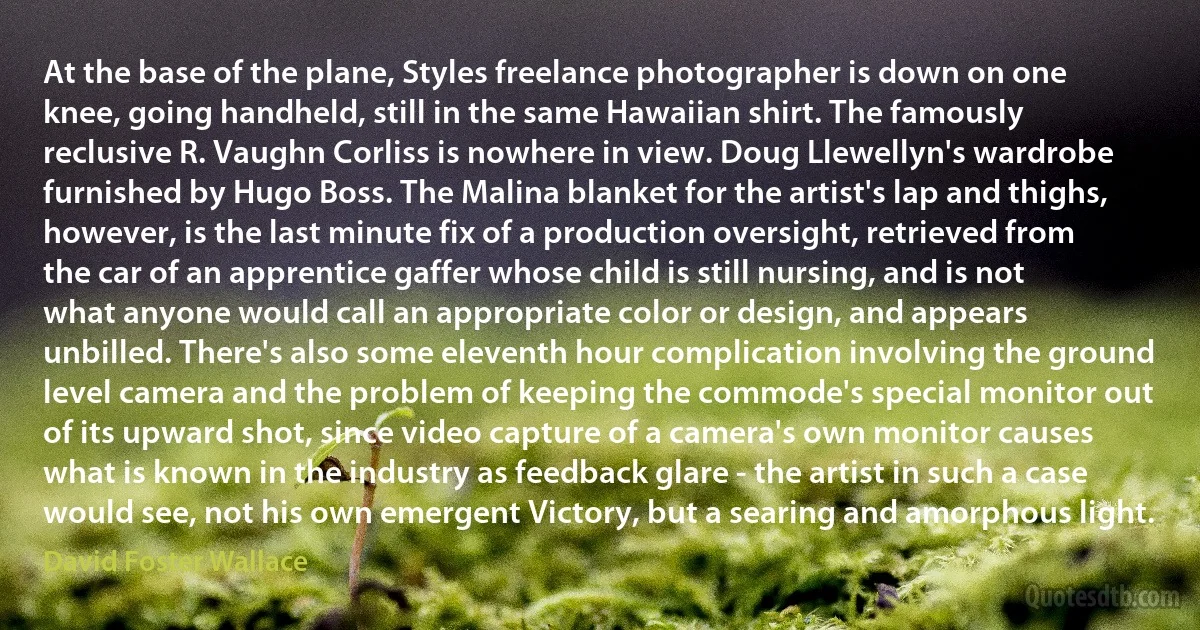
At the base of the plane, Styles freelance photographer is down on one knee, going handheld, still in the same Hawaiian shirt. The famously reclusive R. Vaughn Corliss is nowhere in view. Doug Llewellyn's wardrobe furnished by Hugo Boss. The Malina blanket for the artist's lap and thighs, however, is the last minute fix of a production oversight, retrieved from the car of an apprentice gaffer whose child is still nursing, and is not what anyone would call an appropriate color or design, and appears unbilled. There's also some eleventh hour complication involving the ground level camera and the problem of keeping the commode's special monitor out of its upward shot, since video capture of a camera's own monitor causes what is known in the industry as feedback glare - the artist in such a case would see, not his own emergent Victory, but a searing and amorphous light.
David Foster WallaceRelated topics
anyone base blanket boss call camera case child color complication emergent fix glare ground hawaiian hour industry keeping known last light minute monitor nowhere oversight photographer plane problem production searing see shirt shot victory view wardrobe feedback freelance handheld hugoRelated quotes
For in spite of much greater public interest in all aspects of visual culture, including design and architecture, the challenge posed by contemporary art has not evaporated. We have only to recall the headlines for last year's Turner Prize. "Eminence without merit" (The Sunday Telegraph). "Tate trendies blow a raspberry" (Eastern Daily Press), and my favourite, "For 1,000 years art has been one of our great civilising forces. Today, pickled sheep and soiled bed threaten to make barbarians of us all" (The Daily Mail). Are these papers speaking the minds of their readers? I have no delusions. People may be attracted by the spectacle of new buildings, they may enjoy the social experience of visiting a museum, taking in the view, an espresso or glass of wine, purchasing a book or an artist designed t-shirt. Many are delighted to praise the museum, but remain deeply suspicious of the contents.

Nicholas Serota
Poor Joshua! Victim of repeated attacks by an irresponsible, bullying, cowardly, and intemperate father, and abandoned by respondents who placed him in a dangerous predicament and who knew or learned what was going on, and yet did essentially nothing except, as the Court revealingly observes, ante, at 193, "dutifully recorded these incidents in [their] files." It is a sad commentary upon American life, and constitutional principles - so full of late of patriotic fervor and proud proclamations about "liberty and justice for all" - that this child, Joshua DeShaney, now is assigned to live out the remainder of his life profoundly retarded. Joshua and his mother, as petitioners here, deserve - but now are denied by this Court - the opportunity to have the facts of their case considered in the light of the constitutional protection that 42 U.S.C. 1983 is meant to provide."

Harry Blackmun
My friends, the Republican Party did not win the midterm election in November: We lost that election. We lost because voter turnout was abysmally, embarrassingly low, and millions of working people, young people and people of color gave up on politics as usual and they stayed home. That's a fact. In my view, Democrats will not retain the White House, will not regain the Senate or the U.S. House, will not be successful in dozens of governor races across the country, unless we generate excitement and momentum and produce a huge voter turnout. With all due respect – and I do not mean to insult anyone here – that turnout, that enthusiasm, will not happen with politics as usual. The people of our country understand that given the collapse of the American middle class, and given the grotesque level of income and wealth inequality we are experiencing, we do not need more establishment politics or establishment economics.

Bernie Sanders
But what would become of mass production and its system of financial expansion if technical perfection, durability, social efficiency, and human satisfaction were the guiding aims. The very conditions for current financial success - constantly expanding production and replacement - works against these ends. To ensure the rapid absorption of its immense productivity, megatechnics resorts to a score of different devices: consumer credit, installment buying, multiple packaging, non-functional designs, meretricious novelties, shoddy materials, defective workmanship, built-in fragility, or forced obsolescence through frequent arbitrary changes of fashion. Without constant enticement and inveiglement by advertising, production would slow down and level off to normal replacement demand. Otherwise many products could reach a plateau of efficient design which would call for only minimal changes from year to year.

Lewis Mumford
As in the case of the individual, not all the information which is available to the race at one time is accessible without special effort. There is a well-known tendency of libraries to become clogged by their own volume; of the sciences to develop such a degree of specialization that the expert is often illiterate outside his own minute specialty. Dr. Vannevar Bush has suggested the use of mechanical aids for the searching through vast bodies of material. These probably have their uses, but they are limited by the impossibility of classifying a book under an unfamiliar heading unless some particular person has already recognized the relevance of that heading for that particular book. In the case where two subjects have the same technique and intellectual content but belong to widely separated fields, this still requires some individual with an almost Leibnizian catholicity of interest.

Norbert Wiener
